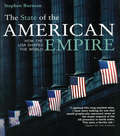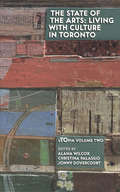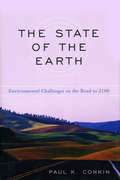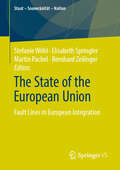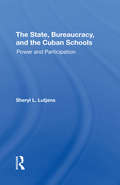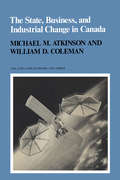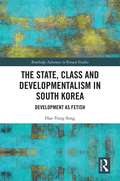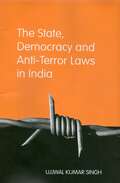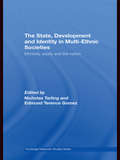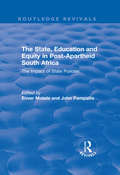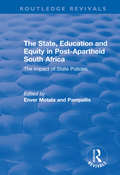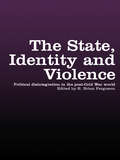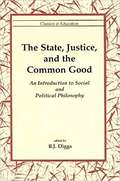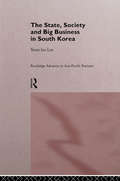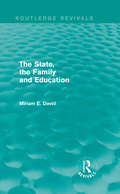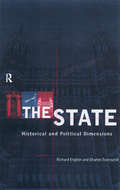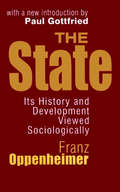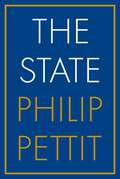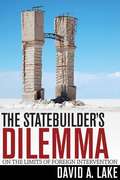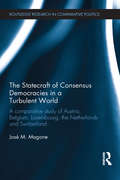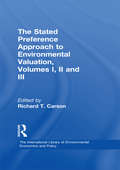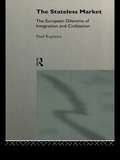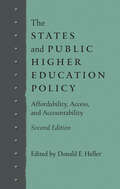- Table View
- List View
The State of the American Empire: How the USA Shapes the World (The Earthscan Atlas)
by Stephen BurmanAs the USA's domination of world affairs meets ever-widening international resentment, this revealing interrogation of America's global footprint explores the complexities of its impact on the world. Covering a wide range of topics - from Wall Street to the War on Terror - The State of the American Empire traces the USA's attempts to balance national interest and global responsibility. It measures America's true effect on world trade and security, locates sites of resistance and levels of antagonism, and, looking ahead, considers the sustainability of its imperial role. With full-colour maps and graphics, this is an essential resource for understanding America's power around the world.
The State of the Arts: Culture in Toronto (uTOpia)
by Alana Wilcox Christina PalassioFreakier rich people. More suburban art. A venue for new music. Better staplers. An infrastructure for hip-hop. Laneway art. More wi-fi. A more understanding marriage between art and business. Affordable live-work spaces. What would make Toronto a better place for the arts? City Hall proclaimed 2006 the Year of Creativity. 'Live With Culture' banners flap over the city. And across the city, donors are ponying up millions for the ROM and the AGO. Culture's never had it so good. Right?The State of the Arts explores the Toronto culture scene from every angle, applauding, assailing and arguing about art in our fair burg. The essays consider the big-ticket and the ticket-free, from the CNE to unintentional art. In between, you'll find thoughts on the 'creative city' and photobloggers, Toronto on film and the fine line between part and art. Taken together the thoughts of these writers, artists and city-builders create a snapshot of culture in T.O. as it grows from 'Toronto the Good' to 'Toronto the Could' to 'Toronto the Can-Do.'Includes sixteen colour pages of eye-level Toronto, and cover art by Susan Szenes.With essays by Sandra Alland, Jason Anderson, Anna Bowness, Stephen Cain, Kate Carraway, Hanna Cho, Brendan Cormier, Natalie De Vito, Liz Forsberg, Mark Fram, Marc Glassman, Katarina Gligorijevic-Collins, Brenda Goldstein, Amy Lavender Harris, Karen Hines, Sarah B. Hood, Christopher Hume, Sam Javanrouh, Dory Kornfeld, Adam Krawesky, More Or Les, John Lorinc, James MacNevin, Claudia McKoy, Brian McLachlan, Ryan McLaren, Shawn Micallef, Jill Murray, Matt O'Sullivan, Christopher Pandolfi, Michael Redhill, Dylan Reid, Damian Rogers, Stuart Ross, Lisa Rundle, Dana Samuel, Nadja Sayej, Susan Szenes, Kevin Temple, Pablo Torres, Gayla Trail, Rannie Turingan, Jason van Eyk, Adam Vaughan, RM Vaughan, Stéphanie Verge, Lisa Whittington-Hill and Carl Wilson.
The State of the Earth: Environmental Challenges on the Road to 2100
by Paul K. ConkinAn assessment of where we are, where we&’re headed, and what we need to do before it&’s too late: &“Instructive, well-researched, and easy-to-read.&” —John T. Ackerman, Strategic Studies Quarterly This era of staggering scientific and technological innovations, with major changes in agriculture, manufacturing, commerce, and communications, seems to document unparalleled human achievement. Yet when we examine the long-term implications, it becomes clear that the delicate environmental balance that sustains life on this planet is under serious threat, and the past century may be remembered not as a period of great progress but as one marked by unrestrained consumption and failure to come close to a sustainable use of the earth&’s limited natural resources. In The State of the Earth, noted historian Paul K. Conkin provides a comprehensive analysis of the many environmental hazards that humans must face in this still-young century. Our activities have threatened the survival of many plants and animals, created scarcities in cultivatable soils and water needed for irrigation, used up a large share of fossil fuels, polluted air and water, and most likely created conditions that will lead to devastating climate changes. This is an invaluable resource for those who desire a broad yet thorough and scientifically informed introduction to present environmental challenges.
The State of the European Union: Fault Lines in European Integration (Staat – Souveränität – Nation)
by Elisabeth Springler Stefanie Wöhl Martin Pachel Bernhard ZeilingerAgainst the backdrop of combating the financial and economic crisis in the European Union for the past decade, this volume strives to explore the manifold impacts the prevailing crisis management has on the further alignment of European Integration. The efforts targeted at overcoming the financial and economic crisis evoked far-reaching consequences on the societal, economic, and political level within European member states, which in turn challenge the institutional alignment, democratic legitimacy and economic coherence of the European Union. Taking into account current developments in the EU, the contributions presented in this volume focus on the ‘fault lines’ in the integration process, i.e. questions of policy coherence, democratic accountability, financialization, militarization, migration, gendered social and economic asymmetries as well as the rise of populist and extreme right-wing parties. The volume focuses on how these different developments come together by relating aspects of transdisciplinary research to uncover the fault lines in the European integration project in the subsequent chapters. ContentEconomic and Democratic Governance • Right Wing Populism and Right Extreme Parties • Financialization and Militarization • Social Exclusion, Welfare and Migration Policies EditorsProf. (FH) Dr. Stefanie Wöhl, University of Applied Sciences BFI Vienna. Prof. (FH) Dr. Elisabeth Springler, University of Applied Sciences BFI Vienna. Mag. Martin Pachel, University of Applied Sciences BFI Vienna. Dr. Bernhard Zeilinger, University of Applied Sciences BFI Vienna.
The State, Antisemitism, and Collaboration in the Holocaust
by Diana DumitruBased on original sources, this important new book on the Holocaust explores regional variations in civilians' attitudes and behavior toward the Jewish population in Romania and the occupied Soviet Union. Gentiles' willingness to assist Jews was greater in lands that had been under Soviet administration during the inter-war period, while gentiles' willingness to harm Jews occurred more in lands that had been under Romanian administration during the same period. While acknowledging the disasters of Communist rule in the 1920s and 1930s, this work shows the effectiveness of Soviet nationalities policy in the official suppression of antisemitism. This book offers a corrective to the widespread consensus that homogenizes gentile responses throughout Eastern Europe, instead demonstrating that what states did in the interwar period mattered; relations between social groups were not fixed and destined to repeat themselves, but rather fluid and susceptible to change over time.
The State, Bureaucracy, And The Cuban Schools: Power And Participation
by Sheryl L. LutjensIn the mid-1980s Cuba began a process of ‘rectificacion’—a reform process that has bucked the trends of economic and political liberalization that are reshaping the global order. Sustaining an official commitment to socialism in the face of economic crisis and international pressures, Cuba's survival seems puzzling indeed. Sheryl Lutjens uses the C
The State, Business, and Industrial Change in Canada
by Michael M. AtkinsonThe late twentieth century has seen profound changes in the character of the international economic order. According to the authors of this study, Canada has failed to come to terms with those changes. Our industrial policy is diffuse, ad hoc, and sectoral. Michael Atkinson and William Coleman argue that in order to analyse Canada's industrial policy effectively, particular attention must be given to industry organization, state structures, and systems of interest intermediation at the sectoral level. To make such an analysis they introduce the concept of policy network, and apply it to three types of industrial sectors: the research-intensive sectors of telecommunications manufacturing and pharmaceuticals; the rapidly changing sectors of petrochemicals and meat processing; and the contracting and troubled sectors of textiles, clothing, and dairy processing. Through the lens of these sectors Coleman and Atkinson shed considerable light on the intersection of political considerations and policy development, and offer a new base on which to move forward in planning for economic growth.
The State, Class and Developmentalism in South Korea: Development as Fetish (Routledge Advances in Korean Studies)
by Hae-Yung SongThis book problematises the statist underpinnings of the concept of the ‘developmental state,’ in terms of both state–society and national–global relations, challenging the notion that the state is the agent of national development qua being autonomous from the domestic and global economies. Presenting a thorough and comprehensive critical assessment of the extant approaches and theories of the Korean developmental state in particular, this book demonstrates that the existing literature, including Marxist critiques, only inadequately and partially challenge statism. It examines how statism reinforces and is reinforced by ‘Third World Developmentalism’, the idea that ‘development’ is in itself a positive goal and that a nationally autonomous mode of development should be promoted as a means of empowerment. In opposition, this book offers a critique of statism by constructing an alternative theoretical framework, extending Marx’s concept of commodity fetishism to state–society and national–global relations. Drawing on a new theoretical framework and significant Korean literature, The State, Class and Developmentalism in South Korea offers a novel historical interpretation and critique of the developmental state in the Korean context. As such, it will be useful to students and scholars of Asian studies, Development Studies and International Political Economy.
The State, Democracy and Anti-Terror Laws in India
by Ujjwal Kumar SinghLaws like the Prevention of Terrorism Act (POTA) are enacted to address what the state describes as extraordinary situations and put in place exceptions to the ordinary legal and judicial procedures. By examining public debates surrounding extraordinary laws like POTA and the Terrorist and Disruptive Activities (Prevention) Act (TADA) and also specific cases, trials and judgements under the Acts, the author - argues that extraordinary laws have ramifications for people’s lives, political institutions, the rule of law and democratic functioning; - shows how such laws assume ‘normalcy’ and acquire a place of permanence in state practices; and - examines the ways in which such extraordinary laws manifest dominant configurations of political power and ideology. While exploring the unfolding of POTA in specific contexts, the book shows how the law was enmeshed in the politics of Hindutva, electoral and coalition politics, centre-state relations, the politics of repression and reconciliation against nationality struggles, and issues of poverty and development.
The State, Development and Identity in Multi-Ethnic Societies: Ethnicity, Equity and the Nation (Routledge Malaysian Studies Series)
by Nicholas Tarling Edmund Terence GomezThe controversial work of Amy Chua argues that, as rapid modernization, industrialization, technological change and globalization bring about fundamental changes in national, ethnic and class identities, especially in developing countries, there is a danger that the laissez-faire capitalist system will cause serious racial conflagration, especially in societies where there is ethnic minority market dominance, combined with ethno-nationalist-type politicians who mobilize support from ethnic majority communities by drawing attention to inequalities in wealth distribution. This controversial work goes on to argue for an authoritarian political system, with curbs against the corporate expansion of enterprises owned by ethnic minorities, until parity in equity ownership among all communities is achieved. This book tests the assumptions behind these arguments, discussing ethnic communities, identity, economy, society and state, and the links between them, in a range of countries in East Asia, Southeast Asia, and the Pacific, and diaspora communities of Asian peoples in the West. It demonstrates that identity transformation occurs as generations of minority communities succeed each other, that old discourses of fixed origins which are assumed to bind ethnic communities into cohesive wholes do not apply, that there are very extensive inter-linkages in the daily activities of people of different ethnic and religious backgrounds, that affirmative action-type policies along racial lines can undermine overall societal cohesion, and that there is no case for limiting democracy until economic equity is achieved. This is a rich, important book, with huge implications for economic development and for states throughout the world as multi-ethnic societies world-wide become more extensive and more complicated.
The State, Education and Equity in Post-Apartheid South Africa: The Impact of State Policies (Routledge Revivals)
by Enver MotalaThis title was first published in 2002: Has the South African post-apartheid state been able to achieve its stated goals? What has been the relationship between the process of educational reform and the impact on the state of the Constitution and other laws? This seminal book responds to these questions by examining the development and implementation of social policy in South Africa during the first years of democratic government, particularly in relation to education. The post-apartheid state was immediately faced with a broad spectrum of political, social, economic and human rights issues. The research analyzes whether the aims and objectives of the new administration were achieved; no other single collection of research in South Africa collectively explores the issues raised in this endeavour. The book will appeal to a wide range of professionals including researchers, academics, planners, policy makers, public servants and postgraduate students.
The State, Education and Equity in Post-Apartheid South Africa: The Impact of State Policies (The\making Of Modern Africa Ser.)
by Enver MotalaThis title was first published in 2002: Has the South African post-apartheid state been able to achieve its stated goals? What has been the relationship between the process of educational reform and the impact on the state of the Constitution and other laws? This seminal book responds to these questions by examining the development and implementation of social policy in South Africa during the first years of democratic government, particularly in relation to education. The post-apartheid state was immediately faced with a broad spectrum of political, social, economic and human rights issues. The research analyzes whether the aims and objectives of the new administration were achieved; no other single collection of research in South Africa collectively explores the issues raised in this endeavour. The book will appeal to a wide range of professionals including researchers, academics, planners, policy makers, public servants and postgraduate students.
The State, Identity and Violence: Political Disintegration in the Post-Cold War World (War And Society Ser.)
by R. Brian FergusonIn this book, a collection of experts investigate the varied forces - from global systems to local beliefs - that lead to civil violence, chaos and, perhaps, a new political order.The State, Identity and Violence explores acts of mass violence occurring within national borders and examines the links such acts have to personal identities and how they challenge the character or very existence of the state. Building upon the anthropological premises of holism and cross-cultural comparison, this volume shows how violent challenges to existing states should be conceptualized as layered problems, with multiple kinds of causes. It not only goes beyond the "ancient hatreds" explanation, but shows the inadequacy of the concept of "ethnic violence" and of theories which treat interests and identities as separate, sometimes opposed variables
The State, Justice, and the Common Good: An Introduction to Social and Political Philosophy
by B. J. DiggsThe State, Justice, and the Common Good An Introduction to Social and Political Philosophy
The State, Society and Big Business in South Korea (Routledge Advances in Asia-Pacific Business)
by Yeon-Ho LeeThis book examines how the South Korean state is able to execute national policies that are opposed to the interests of social constituents, despite the expansion of social power. The relationship between the government and big business provides an illuminating example of this. The author demonstrates how Confucian values, the role of the family and a firm hierarchical tradition have prevented South Korea from developing a modern state on the Western model.
The State, the Family and Education (Routledge Revivals)
by Miriam DavidIn The State, The Family and Education, first published in 1980, Miriam David provides an entirely new analysis of the relationship of the State to the family and education. David shows how the State, through its educational policies, regulates family relationships with, and within, schools. This book provides a welcome analysis of educational policy from a socialist-feminist perspective, re-examining the ways in which women as parents, teachers and pupils are involved in the education system. This book will be of interests to students of education.
The State: Historical And Political Dimensions
by Charles Townshend Richard EnglishDrawing on current debates on secessions within the United Kingdom, this book analyses the British State today and looks at its place in the future. Featuring original contributions from a variety of disciplines, this study tackles the problem of defining and studying the state and looks at the role the nation-state has played as the basic political unit in Europe and throughout the world.
The State: Its History and Development Viewed Sociologically
by Franz OppenheimerThe State represents the epitome of Franz Oppenheimer's thinking. It integrates political and historical philosophy on the one hand, with economic philosophy on the other. Oppenheimer believed the future progress of nations would be in the direction of liberal socialism. He foresaw a society free from all monopolistic tendencies through unfettered competition.According to Oppenheimer, competition is restrained by a powerful class monopoly, created not through economic differentiation, but through political power. This class monopoly stands between the masses and the land. The laboring class is subject to the will of the upper classes because it does not control the means of production necessary to work in its own interest. Oppenheimer asserts that the right to hold more land than one can properly work through his own efforts and the efforts of his family cannot exist without political control, and is the single most important explanation for the formation of monopolies in human society. He proves his theory in an original analysis.Paul Gottfried writes in the new introduction that The State sums up and illustrates Oppenheimer's general theory of the origin, development, and expected transformation of the state, central political institution of the modern world. Much of Oppenheimer's work embodies the same independent spirit reflected in his way of life. The State provides a wealth of information for economists, political theorists, and sociologists.Franz Oppenheimer was professor of economics and sociology at the University of Frankfurt in Germany until he retired in 1929. In 1933 he was forced to flee the Nazi regime and eventually came to the United States, where he died in 1943.Paul Gottfried is professor of political science at Elizabethtown College in Pennsylvania. He is the author of The Search for Historical Meaning; Carl Schmitt: Politics and Theory; Conservative Millenarians: The Romantic Experience in Bavaria; and After Liberalism (forthcoming from Princeton University Press). He is general editor of Religion and Public Life.
The State: Normative Analysis Of The State
by Philip PettitA major new account of the state and its importance by a leading political philosopherThe future of our species depends on the state. Can states resist corporate capture, religious zealotry, and nationalist mania? Can they find a way to work together so that the earth heals and its peoples prosper? Or is the state just not up to the task? In this book, the prominent political philosopher Philip Pettit examines the nature of the state and its capacity to serve goals like peace and justice within and beyond its borders. In doing so, he breaks new ground by making the state the focus of political theory—with implications for economic, legal, and social theory—and presents a persuasive, historically informed image of an institution that lies at the center of our lives.Offering an account that is more realist than utopian, Pettit starts from the function the polity is meant to serve, looks at how it can best discharge that function, and explores its ability to engage beneficially in the life of its citizens. This enables him to identify an ideal of statehood that is a precondition of justice. Only if states approximate this functional ideal will they be able to deal with the perennial problems of extreme poverty and bitter discord as well as the challenges that loom over the coming centuries, including climate change, population growth, and nuclear arms.
The Statebuilder's Dilemma: On the Limits of Foreign Intervention
by David A. LakeThe central task of all statebuilding is to create a state that is regarded as legitimate by the people over whom it exercises authority. This is a necessary condition for stable, effective governance. States sufficiently motivated to bear the costs of building a state in some distant land are likely to have interests in the future policies of that country, and will therefore seek to promote loyal leaders who are sympathetic to their interests and willing to implement their preferred policies. In The Statebuilder's Dilemma, David A. Lake addresses the key tradeoff between legitimacy and loyalty common to all international statebuilding attempts. Except in rare cases where the policy preferences of the statebuilder and the population of the country whose state is to be built coincide, as in the famous success cases of West Germany and Japan after 1945, promoting a leader who will remain loyal to the statebuilder undermines that leader's legitimacy at home. In Iraq, thrust into a statebuilding role it neither anticipated nor wanted, the United States eventually backed Nouri al-Malaki as the most favorable of a bad lot of alternative leaders. Malaki then used the support of the Bush administration to govern as a Shiite partisan, undermining the statebuilding effort and ultimately leading to the second failure of the Iraqi state in 2014. Ethiopia faced the same tradeoff in Somalia after the rise of a promising but irredentist government in 2006, invading to put its own puppet in power in Mogadishu. But the resulting government has not been able to build significant local support and legitimacy. Lake uses these cases to demonstrate that the greater the interests of the statebuilder in the target country, the more difficult it is to build a legitimate state that can survive on its own.
The Statecraft of Consensus Democracies in a Turbulent World: A Comparative Study of Austria, Belgium, Luxembourg, the Netherlands and Switzerland (Routledge Research in Comparative Politics)
by José M. MagoneDrawing on the work of Arend Lijphart, this book focuses on consensus democracies. These democracies entail a complex set of democratic institutional and conventional arrangements and can be regarded as a product of path-dependent development towards a national culture of compromise and bargaining. Taking a multi-dimensional and multi-spatial approach, this book examines the West central European consensus democracies of Austria, Belgium, Luxembourg, Netherlands and Switzerland, over the past 40 years. Magone examines how these democracies have been transformed by Europeanization thrusts and global turbulence yet are able to maintain political stability. It provides historical context including the different phases of transformation: the golden period (1945-1979); disorganised capitalism (1979-1993); and re-equilibration (1993-). It includes chapters on political culture, government, parliament, the rise of populism and political parties, subnational government, and the political economy and concludes deliberating on the relevance of consensus democracies’ experiences for the future of European and global governance. Based on original research, this book will be of strong interest to students and scholars of comparative politics, European government, West European politics, the politics of small states in Europe, and those with a particular interest in the politics of Austria, Belgium, the Netherlands, Luxembourg and Switzerland.
The Stated Preference Approach to Environmental Valuation, Volumes I, II and III: Volume I: Foundations, Initial Development, Statistical Approaches Volume II:Conceptual and Empirical Issues Volume III: Applications: Benefit-Cost Analysis and Natural Resource Damage Assessment (The International Library of Environmental Economics and Policy)
by Richard T. CarsonThere is a truly enormous literature on using stated preference information to place a monetary value on environmental amenities. This three volume set provides the key papers for understanding the historical development of contingent valuation, its theoretical and statistical foundations, and the major controversies. It also contains representative papers covering all of the major application areas in environmental valuation.
The Stateless Market: The European Dilemma of Integration and Civilization
by Paul KapteynThis book offers a broad view of the tension between state and market in the political evolution of the European Union.Contemporary developments and issues are set within the historical context of state formation. Paul Kapteyn argues that states are invariably formed by violent conquest, or by fusion in the face of an external threat; and that markets can emerge only only when the state has been established. He points out that while the histories of France, Britain, The Netherlands and Germany conform to these rules, the European Union does not; and he goes on to explore the reasons why this is not so, and its implications. The second section of the book is based on empirical research. Paul Kapteyn underpins his theoretical and historical argument with an analysis of official documents, newspaper articles and interviews with Eurocrats form the various member states. He concentrates especially on two case studies, of the Treaty of Schengen on judicial cooperation and harmonization, and of the problem of EU fraud. He also looks closely at eh consquences of the Maastricht Treaty.The Stateless Marlet is a thought-provoking text, ideally suited to students on European studies, politics, international relations and sociology courses. it will also be of great interest to those professionally concerned with European integration.
The States and Public Higher Education Policy: Affordability, Access, and Accountability
by Donald E. HellerAffordability, access, and accountability have long been among the central challenges facing higher education—and they remain so today. Here, Donald E. Heller and other higher education scholars and practitioners explore the current debates surrounding these key issues. As students and their families struggle to meet rising tuition prices, and as state funding for higher education dwindles, policymakers confront issues of affordability within state and institutional budgets. Changing demographics and challenges to affirmative action complicate the admissions process even as colleges and universities seek to diversify enrollments. And issues of institutional accountability have forced the restructuring of higher education governing boards and a reexamination of the role of public trustees in governance.This collection analyzes how issues of affordability, access, and accountability influence the way in which state governments approach, monitor, and set public higher education policy. The contributors examine the latest research on pressing challenges, explore how states are coping with these challenges, and consider what the future holds for public postsecondary education in the United States.
